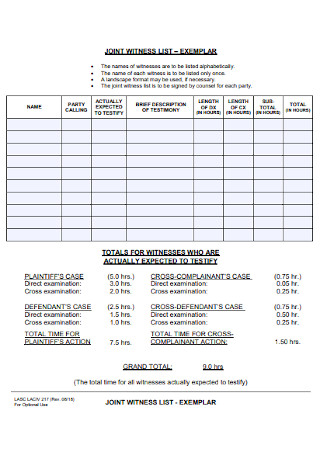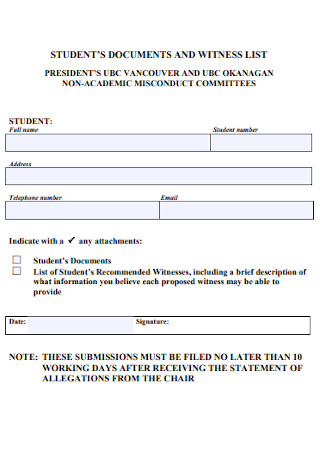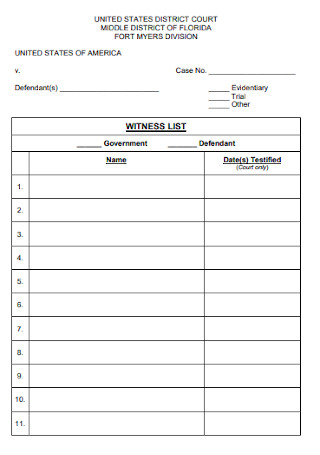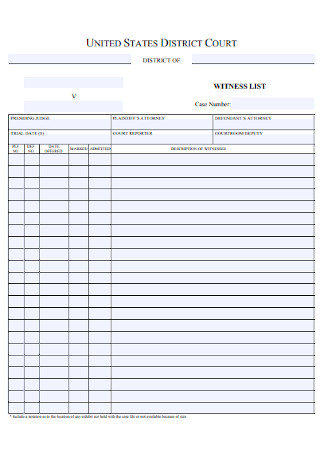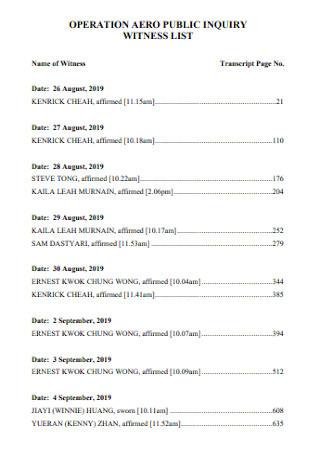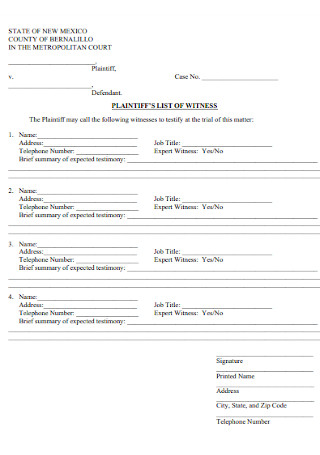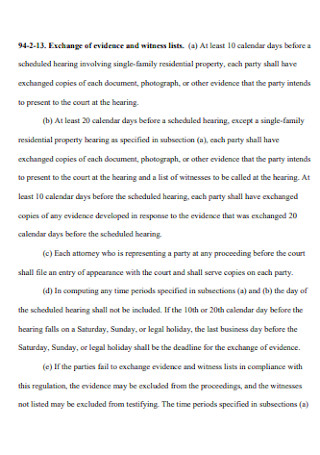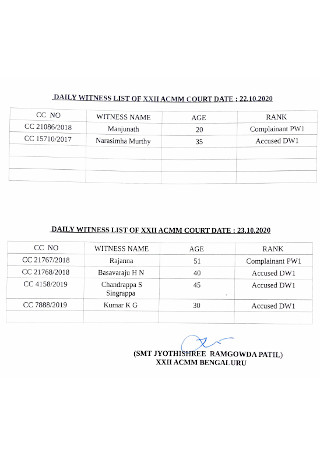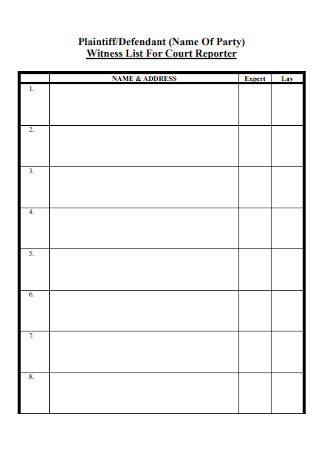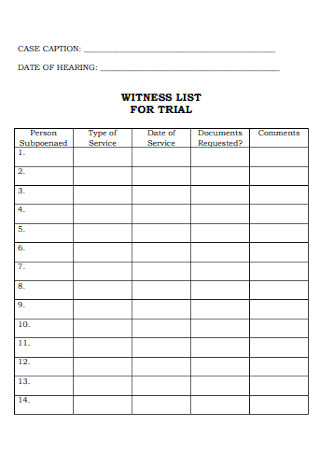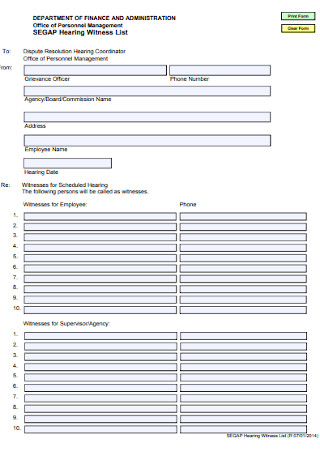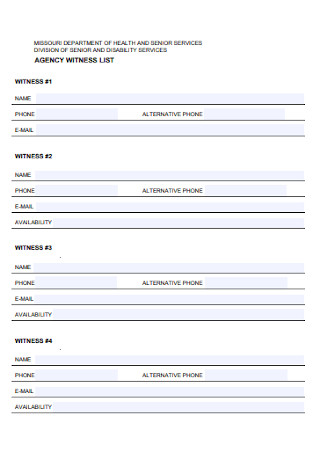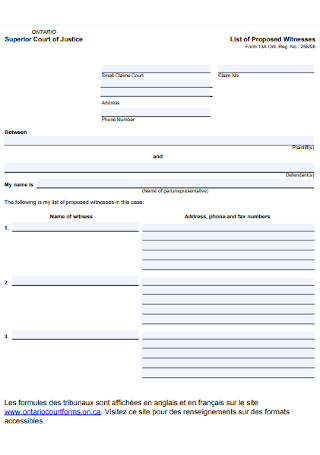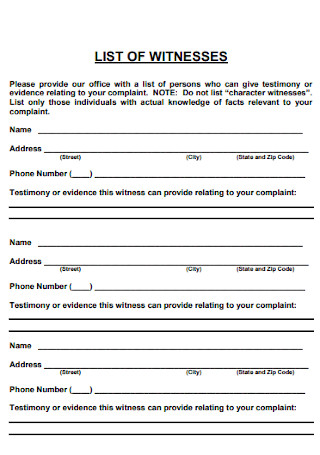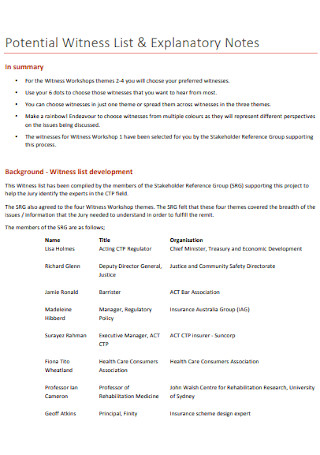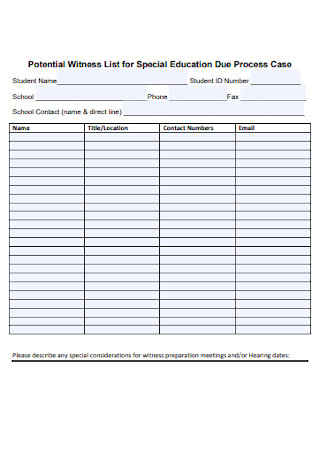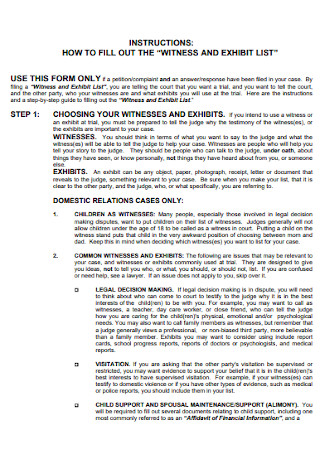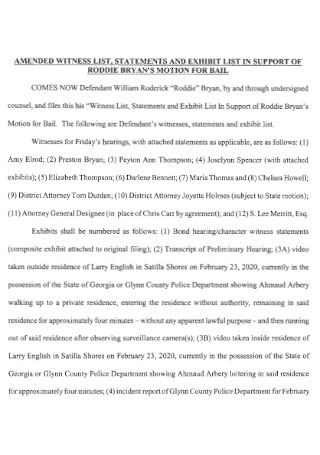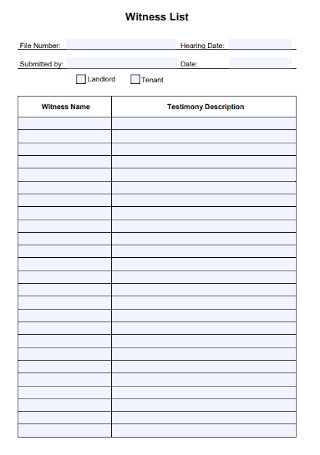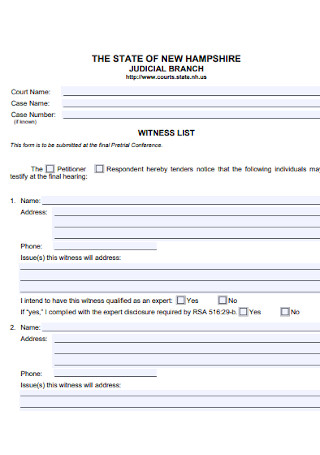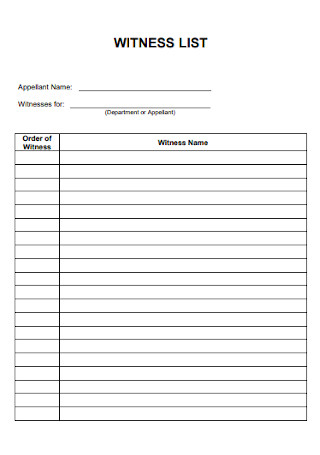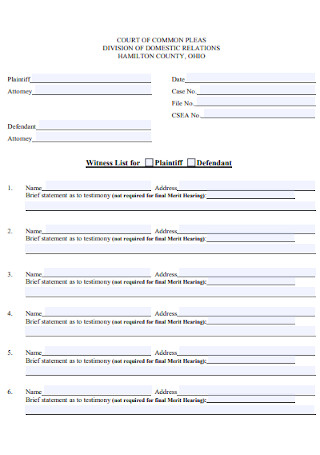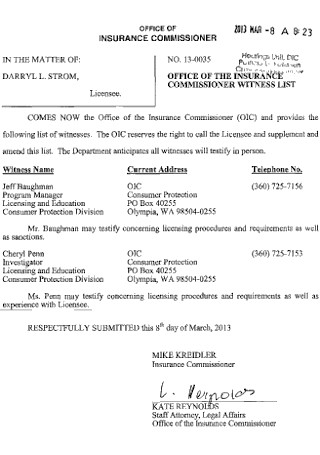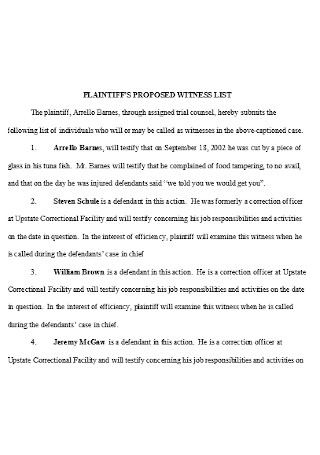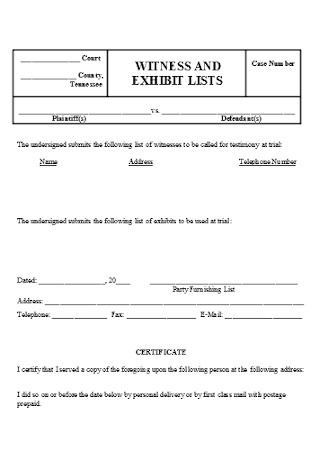FREE Witness List s to Download
What Is a Witness List?
A witness list is a legal document that is submitted to a court for criminal and civil cases. The document contains a complete list of names of the witnesses that either the defense or prosecution plan on presenting in court.
According to an article by the Constitutional Rights Foundation, a court prosecutors survey found that an estimated 77,000 suspects are arrested based on eyewitness account or testimony per year.
Types of Witnesses
In a legal sense, witnesses can fall into different categories. It is important to distinguish the different type of court witnesses and be familiar with each of their functions.
Lay Witness. A lay witness is also sometimes referred to as an eye witness. They are the most direct type of witness such that they were physically there during the incident or are privy to the events that occurred. A lay witness can be someone who may have connections to the parties directly involved in the case or they can be a total stranger or bystander on the street. It can be someone who just happened to be at the scene of the crime or actually saw the events unfold at the time. If you happen to be at the same place and time as the incident, then you can either be called in as an official witness or you can also come forward with what you know and take the initiative to help authorities. Especially in criminal cases, eye witnesses can be the key to unlocking and solving the case. They could very well provide the breakthrough that law enforcement need to deliver justice and recompense. Essentially anyone can be a lay witness or eye witness, as long as their testimony is deemed relevant to the case and within the courtroom. Character Witness. Another type of witness that may be called to testify is a character witness. Unlike a lay witness who can be a random person or individual, a character witness is someone who personally knows the defendant, victim, or persons directly involved in the case. The purpose of these types of witnesses is to testify to the character and background of the individuals involved in the charges or lawsuit. They can be a family friend, childhood classmate, best friend, family member, colleague, former supervisor, etc. Character witnesses help provide context and depth to the case, especially when public opinion is highly biased and partial. For example, they can offer a detailed account on a defendant’s rough childhood, personal problems, and other statement or stories that may not be public knowledge. Character witnesses are also highly important in civil cases such as divorce proceedings or custody battles. For instance, one witness account may paint a picture of a negligent or absent parent and thus, could significantly determine which parent or guardian is most fit to get primary custody of the children. Expert Witness. An expert witness is another kind of witness, but is no less important than the other types of witnesses. These types of court witnesses are regarded for their professional opinion and expertise. They can be called in the by the state or court to shed light on certain aspects or elements of the case. For instance, a medical professional is one of the most common expert witness. A doctor may be called to testify to reaffirm or reject certain claims by either party. They can provide scientific evidence or a medical perspective to help clarify a contentious issue in court. Other expert witnesses can include forensic experts, medical examiners, emergency responders, psychiatrists or psychologists, and coroners. A coroner or the individual who performed the autopsy may be called to testify in order to clarify and explain the nature of death of a victim in a criminal proceeding. A licensed psychiatrist may be tapped to help determine if a defendant is fit to stand trial or not. As an expert witness, their psychological evaluation bears some weight that could potentially influence the outcome of the trial or the decision of the judge. In summary, expert witnesses-regardless of field- are selected if their educated conclusions can be relevant and helpful to the trial or case.
Important Roles of a Witness
A witness plays an important role in the courtroom. Their testimony can have the potential to make or break a case. Whether it is a lay witness or a character witness, these main functions or roles apply to any type of court witness.
Tell the Truth. The most basic and fundamental role of a witness is to tell the truth. A court witness has a responsibility not just to law enforcement but especially to the common good and the public’s welfare. It is standard procedure that before a witness is examined and interviewed, they must take an oath and swear before God and man to only testify to the truth. Of course, this is easier said than done. Self-preservation and self-interest are hard to bypass. Unfortunately, in an imperfect justice system, it is not uncommon for a witness to be coerced or forced into a deal that makes it more difficult to uncover or tell the truth. There can be multiple reasons why a witness fails to be truthful while taking the stand. Sometimes, it can be plain human error such as a lapse in judgment or memory. While others deliberately tell lies and falsehoods even after taking an oath of sworn testimony. One of the most critical issues of witness testimony is credibility. An uncredible witness is someone who changes his or her stories and is unable to stick to one version of the story. For a witness statement or testimony to be deemed credible, it must be consistent and forthright. Cooperate with Authorities. Witnesses, whether voluntary or not, are bound by law to cooperate and help law enforcement carry out justice. A witness can be crucial to a case; and if they refuse to help or cooperate with authorities then it can comprise or delay the legal process. Whether it is an eye witness or a character witness, their sworn testimony can help provide a clearer picture of the incident or event and thus, move the case forward. There are witnesses who are willing to help and need no convincing from authorities. But there are also some who refuse to testify and cooperate for a number of reasons. Some are unwillingly to help out of fear, harassment, inconvenience or they simply do not want to get involved in the matter. In these cases, a witness may be served a subpoena or an order to show up before the court. Especially if their testimony can potentially shift the case, the individual is often left with no choice but to appear in court before a judge or jury. Offer Context and Perspective. Another vital function of a witness is to offer context relevant to a case. A witness statement, whether it is a descriptive account or a character testimony, can help shape the opinions and decision of a court judge or jury. A strong witness testimony can even potentially influence the overall outcome of a trial. In both criminal and civil cases, rarely are things black and white. With the information provided by witnesses, the potential for more gray areas to surface is higher. This is not necessarily a bad thing. Gray areas just mean that the matter is more complex than what can simply be accepted at face value. In many ways, the different perspectives add dimension to the people and circumstances surrounding the case. And whether the sworn statements help the prosecution or the defense, there is no denying that putting things into context is important to fully understand the situation or incident. For example, character witnesses can shed light on a domestic or marital situation and offer valuable perspective on an individual’s past or background. Answer the Questions Asked. Providing information is an integral function of a witness. On the part of the legal teams, part of the process of obtaining information is asking the right questions. Both the prosecuting and defense team are given the opportunity to interview or cross examine the witnesses. The cross-examination process is needed to further verify facts and to test the credibility and reliability of a witness. It is an important and necessary step in building a case or argument. Eye witnesses, expert witnesses and character witnesses must answer the questions to the best of their ability and power. If you are called to the stand but cannot or are unable to provide a conclusive answer, it is acceptable to admit you do not have any knowledge regarding the matter. However, purposely withholding crucial information or denying the truth is a whole other story. Again, as discussed previously, the most basic requirement a witness is called to do is to tell the truth and this means answering the questions truthfully and to the best of one’s memory.
How to Create a Witness List
To create a witness list, research is a non-negotiable prerequisite. The list itself is not difficult to make; but the time, effort, and planning that goes into dealing and prepping witnesses can be considerable. To make a witness list in the shortest amount of time possible, the best and most practical option is to use a template. Simply choose a template that suits your needs and follow the step-by-step instruction guide below.
Step 1: Choose a Template
The first step is to choose a ready-made template. Of course, you can always create your own witness list if you prefer to start with a clean slate. As mentioned in previous sections, a witness list is a standard court document. And since it is a standardized document, it needs to adhere to certain guidelines and rules. Particularly, you need to follow a set of guidelines pertaining to format. Fortunately, there are editable and downloadable templates available that you can use as a reference guide or a blueprint for your witness list. There are dozens of professionally designed templates above that you can easily customize to suit your legal needs. Or better yet, you can also use the form provided by the law firm or your local court.
Step 2: Provide a Title and Basic Case Details
After choosing a template, the next step is to input the document title and its case details. The title is typically the local court division and the name of the county, district, or specific location. So whether it is the State of Florida or Michigan, it is important to not just cite the state but also the specific district or area. In addition to the title, you should also include the basic details of the case. Official court documents contain the case number and the name of the plaintiff and the defendant. The latter is the name of the accused while the former is the one filing the complaint. These are usually just the basic details needed, but you can also include other important information as well such as the case type and what party you are representing.
Step 3: Check the Format
After covering all the basic details, you can then proceed to the actual list. First, you need to decide on a format for your witness list. Since it is a list, using a table would help the document appear more presentable and organized. You can easily insert a table using a Word processing application like Microsoft Word or Google Docs. Or if you are using a template that already contains a table, it would be much easier for you to simply input the names of the witnesses. Although not necessarily required, numbering the list can also be helpful. Lastly, you can insert additional columns in the table and provide a short description of each witness- identify the type of witness, note which party they are testifying for, and input the date they testified or are scheduled to testify.
Step 4: List Down the Names of the Witnesses
After establishing the format, the last step is to list down all the witnesses you plan on calling to the stand. Whether you are part of the defense or prosecuting team, it is important to select witnesses that can provide relevant and helpful testimony. These may be lay witnesses, expert witnesses, or character witnesses. It is vital to remember that witnesses can help build and fortify your case; but they can also cause your argument to break down if their statements favor the other party’s interests. In your witness list, make sure to provide the complete names, a brief description of each witness, and their contact information. Finally, always make sure to double check the list and review the names before finalizing and submitting it to the court.
FAQs
What is a witness list?
A witness list is a court document that contains a comprehensive list of names of witnesses for a prosecuting party or a defense team.
What are the 3 types of witnesses?
The three main types of witnesses are lay witnesses (or eye witnesses), character witnesses, and expert witnesses.
What makes a witness uncredible?
An uncredible witness often changes his or her account of a story or is caught lying and sharing falsehoods even when presented with evidence and proof that prove otherwise.
A witness can potentially turn a criminal or civil case around. The importance of witnesses to any legal proceeding cannot be emphasized enough. Browse the wide selection of editable and printable templates above and create your very own witness list today!
